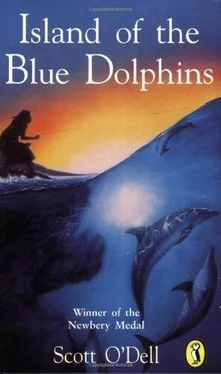Scott O'Dell - Island of the Blue Dolphins
Здесь есть возможность читать онлайн «Scott O'Dell - Island of the Blue Dolphins» весь текст электронной книги совершенно бесплатно (целиком полную версию без сокращений). В некоторых случаях можно слушать аудио, скачать через торрент в формате fb2 и присутствует краткое содержание. Год выпуска: 1966, ISBN: 1966, Издательство: PUFFIN BOOKS, Жанр: Детские приключения, на английском языке. Описание произведения, (предисловие) а так же отзывы посетителей доступны на портале библиотеки ЛибКат.
- Название:Island of the Blue Dolphins
- Автор:
- Издательство:PUFFIN BOOKS
- Жанр:
- Год:1966
- ISBN:978-0-14-192524-0
- Рейтинг книги:3 / 5. Голосов: 1
-
Избранное:Добавить в избранное
- Отзывы:
-
Ваша оценка:
- 60
- 1
- 2
- 3
- 4
- 5
Island of the Blue Dolphins: краткое содержание, описание и аннотация
Предлагаем к чтению аннотацию, описание, краткое содержание или предисловие (зависит от того, что написал сам автор книги «Island of the Blue Dolphins»). Если вы не нашли необходимую информацию о книге — напишите в комментариях, мы постараемся отыскать её.
Island of the Blue Dolphins won the Newbery Medal in 1961. It was adapted into a film of the same name in 1964. O'Dell later wrote a sequel, Zia, published in 1976.
Island of the Blue Dolphins — читать онлайн бесплатно полную книгу (весь текст) целиком
Ниже представлен текст книги, разбитый по страницам. Система сохранения места последней прочитанной страницы, позволяет с удобством читать онлайн бесплатно книгу «Island of the Blue Dolphins», без необходимости каждый раз заново искать на чём Вы остановились. Поставьте закладку, и сможете в любой момент перейти на страницу, на которой закончили чтение.
Интервал:
Закладка:
The canoes were the biggest loss. To find enough wood to make another would have taken me all the spring and summer. I therefore set out on the first fair morning to search for whatever wreckage the waves had washed ashore.
Among the rocks near the south cliffs I found a part of one canoe, buried in sand and twisted kelp. I worked all morning to dig it free and then, having scraped it clean, could not decide what to do. I could cut the sinews and carry the planks up the cliff two at a time on my back and across the dunes to Coral Cove, which meant many days. Or I could build the canoe here on the rocks and take the chance that another storm would wash it away before I was finished.
I finally did neither of these things. Choosing a day when the sea was calm, I floated what was left of the canoe and, pushing it in front of me, made my way past the sandspit and into the cove. There I took the wreckage apart and moved the planks up the trail, beyond the place where the great waves had reached.
I found the remains of my other canoe. It had been washed far back in the cave and I could not get it out, so I went back to the south cliffs and hunted among the piles of kelp until I had enough pieces of wood, counting what I already had, to begin the building of another.
It was late in the spring now. The weather was still unsettled, with light rain falling most of the days, but I started the new canoe anyway, for I needed it to gather shellfish. No longer did I think of the Aleuts, as I have said, yet without a canoe to go where I wanted, I felt uneasy.
The planks were all about the same size, the length of my arm, but they came from different canoes and were therefore hard to fit together. The holes were ready, however, which saved me much labour and time. Another help was that the great waves had washed ashore long strings of black pitch, which was often difficult to find on the island and which I needed.
When I had sorted out the planks and shaped them, the work went fast, so that by late spring I was ready to finish the seams. It was on a windy morning that I made a fire to soften the pitch. The wind was cold and it took a long time to get the fire going. To hasten it I went down to the beach for dry seaweed.
I had started back with my arms filled when I turned to look at the sky, thinking from the feel of the wind that a storm might be close. Off to the north the skies were clear, but in the east from whence storms sometimes came at this season, stood banks of grey clouds, one on top of the other.
At this moment, in the deep shadows cast by the clouds, I saw something else. Forgetting that I was carrying a load of seaweed, I threw up my arms. The seaweed fell to the ground.
A sail, a ship, was there on the sea, half-way between the horizon and the shore!
By the time I had reached the headland it was much closer, moving quickly on the strong wind. I could see that it did not have the red, beaked prow of the Aleuts. Nor did it look like the white men's ship, which I clearly remembered.
Why had it come to the Island of the Blue Dolphins?
I crouched on the headland and wondered, my heart beating fast, if the men who sailed it had come to catch otter. If they were hunters, I must hide before they saw me. They would soon find my fire and the canoe I was making, yet I could go to the cave and probably be safe from them. But if they had been sent by my people to take me away, then I should not hide.
The ship moved slowly between the black rocks and into Coral Cove. I could see the men now and they were not Aleuts.
They lowered a canoe and two of the men paddled towards the beach. The wind had begun to blow hard and the men had trouble landing. Finally one of them stayed behind in the canoe, and the other, the man without a beard, jumped into the water and came along the beach and up the trail.
I could not see him, but after a while I heard a shout, then another, and I knew that he had found my fire and the canoe. The man he had left in the cove did not answer, nor did the men on the ship, so I was sure that he was calling to me.
I crawled down from the rock and went to the house. Since my shoulders were bare, I put on my otter cape. I took my cormorant skirt and the abalone box in which I kept my necklace and ear-rings. With Rontu-Aru I then went along the trail that led to Coral Cove.
I came to the mound where my ancestors had sometimes camped in the summer. I thought of them and of the happy times spent in my house on the headland, of my canoe lying unfinished beside the trail. I thought of many things, but stronger was the wish to be where people lived, to hear their voices and their laughter.
I left the mound and the green grass growing on it among the white shells. I could no longer hear the man calling, so I began to run. When I came to the place where the two trails met, where I had built my fire, I found the footsteps the man had left.
I followed them down to the cove. The canoe had gone back to the ship. The wind was screaming now and mist blew in across the harbour and waves began to pile up on the shore. I raised my hand and shouted. I shouted over and over, but the wind carried my voice away. I ran down the beach and waded into the water. The men did not see me.
Rain started to fall and the wind drove it against my face. I waded farther out through the waves, raising my arms to the ship. Slowly it moved away in the mist. It went towards the south. I stood there until it was out of sight.
29
After two more springs had gone, on a morning of white clouds and calm seas, the ship came back. At dawn I saw it from the headland far out on the horizon. When the sun was overhead it lay anchored in Coral Cove.
Until the sun went down I watched from the headland while the men made a camp on the shore and built a fire. Then I went to my house. All night I did not sleep, thinking of the man who once had called to me.
I had thought of his voice calling for a long time, since the night of the storm when the ship had sailed away. Every day during those two springs and two summers I had gone to the headland and watched, always at dawn and again at dusk.
In the morning I smelled smoke from their fire. I went down to the ravine and bathed in the spring and put on my otter cape and my cormorant skirt. I put on the necklace of black stones and the black ear-rings. With blue clay I made the mark of our tribe across my nose.
Then I did something that made me smile at myself. I did what my older sister Ulape had done when she left the Island of the Blue Dolphins. Below the mark of our tribe I carefully made the sign which meant that I was still unmarried. I was no longer a girl, yet I made it anyway, using the blue clay and some white clay for the dots.
I went back to the house then and built a fire and cooked food for Rontu-Aru and me. I was not hungry and he ate my food and his too.
‘We are going away,’ I said to him, ‘away from our island.’
But he only put his head to one side, as his father often had done, and when I said no more, he trotted out to a sunny place and lay down and fell asleep.
Now that the white men had come back, I could not think of what I would do when I went across the sea, or make a picture in my mind of the white men and what they did there, or see my people who had been gone so long. Nor, thinking of the past, of the many summers and winters and springs that had gone, could I see each of them. They were all one, a tight feeling in my breast and nothing more.
The morning was full of sun. The wind smelled of the sea and the things that lived in it. I saw the men long before they saw the house on the headland, far off on the dunes to the south. There were three of them, two tall men and one who was short and wore a long grey robe. They left the dunes and came along the cliff, and then seeing the smoke from the fire which I kept burning, they followed it, and at last reached my house.
Читать дальшеИнтервал:
Закладка:
Похожие книги на «Island of the Blue Dolphins»
Представляем Вашему вниманию похожие книги на «Island of the Blue Dolphins» списком для выбора. Мы отобрали схожую по названию и смыслу литературу в надежде предоставить читателям больше вариантов отыскать новые, интересные, ещё непрочитанные произведения.
Обсуждение, отзывы о книге «Island of the Blue Dolphins» и просто собственные мнения читателей. Оставьте ваши комментарии, напишите, что Вы думаете о произведении, его смысле или главных героях. Укажите что конкретно понравилось, а что нет, и почему Вы так считаете.











